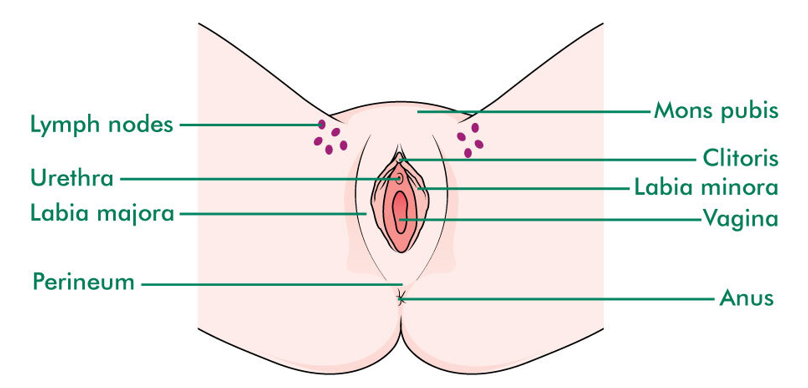Cancer of the vulva (sometimes called Vulvar cancer) is a rare type of cancer that affects women.
The vulva is a woman’s external genitals, which includes:
- the lips surrounding the vagina (labia minora and labia majora)
- the clitoris, the sexual organ that helps women reach sexual climax
- the Bartholin’s glands, 2 small glands each side of the vagina
Most of those affected by vulval cancer are older women over the age of 65 and the condition is rare in women under 50 who have not yet gone through the menopause. Just over 1,300 women are diagnosed with it each year in the UK.
Am I at risk?
The exact cause of vulval cancer is unclear, but your risk of developing the condition is increased by the following factors:
- increasing age
- vulval intraepithelial neoplasia (VIN) – where the cells in the vulva are abnormal and at risk of turning cancerous
- persistent infection with certain versions of the human papillomavirus (HPV)
- skin conditions affecting the vulva, such as lichen sclerosus
- smoking
For more information on the risk factors of vulval cancer, please follow this link.
Symptoms of vulval cancer
Cancer of the vulva can take many years to develop. It usually starts with precancerous cells that change slowly over several years into cancerous cells. As with other cancers, it’s easier to treat and cure if it’s diagnosed at an early stage. Symptoms of vulval cancer can include:
- a persistent itch in the vulva
- pain, soreness or tenderness in the vulva
- raised and thickened patches of skin that can be red, white or dark
- a lump or wart-like growth on the vulva
- bleeding from the vulva or blood-stained vaginal discharge between periods
- an open sore in the vulva
- a burning pain when passing urine
- a mole on the vulva that changes shape or colour
You should see a GP if you notice any changes in the usual appearance of your vulva. While it’s highly unlikely to be the result of cancer, these changes should be investigated.
Patient information
For more information from Macmillan regarding vulval cancer, please follow this link.
For more information from Cancer Research UK regarding vulval cancer, please follow this link.
